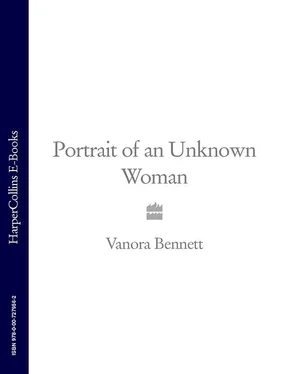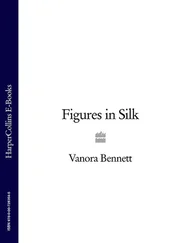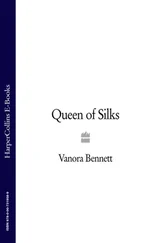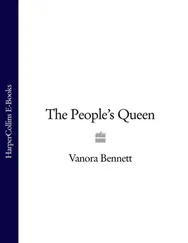Some of the apothecaries and herbalists on Bucklersbury had shops, with scales in the window and herbs and spices and preserves on shelves behind. Some plied their trade from the street. We were followed the length of the street by a mad beggar with rolling eyes, yelling comically, ‘Unicorn’s horn! Unicorn’s horn!’, which made John Clement laugh and give the man a coin to go away; which only made the man, who said he was called Davy, follow us closer and louder than ever. It wasn’t the unicorn’s horn that John bought me in the end, or the dragon-water or treacle of the more respectable traders, or the dried crocodile hanging in the shop under the sign of the harp. It was a little bottle, painted sweetly with flowers, from an old countrywoman who had set up her stall on a wall away from the main rush of business.
‘Good day, mistress,’ he said courteously to her, ‘I’m looking for heartsease,’ and the wrinkled old white head nodded wisely at us both with a flash of pale eyes.
‘Washes away your sorrows … raises your spirits,’ she said knowingly. ‘Add it to a glass of wine. Twice a day, morning and evening, six drops.’
He presented it to me with an adult’s flourish; ‘for sorrow,’ he said lightly, and his favourite motto, ‘never look back; tomorrow brings new joys’; but he didn’t quite meet my eyes. It was as if this grown man, my teacher, had suddenly become just a little bit shy.
I kept the heartsease in its pretty bottle. (I couldn’t bear to drink it. But it did its job even so.) It was only the first of my presents from walks in Bucklersbury, because we went back and back. That was just the beginning of our joint fascination with the secrets of the street. It wasn’t just those two herbalists – Mad Davy with his unicorns’ horns, pigs’ trotters and tall stories, or old Nan with her pretty coloured potions – whom we got to know. They were my first favourites, but there was a whole crowd of other odd fish packed into Bucklersbury. Alchemists and barbers and surgeons and tooth-pullers; scientists and frauds and soothsayers. As the weeks and months went by, we got to know every wise man and eccentric in the place.
It was always on a Thursday, every week. It was our secret. I would put on my cape after dinner and be waiting for him by the door. (‘You’re like a dog, waiting so faithfully, grinning,’ Elizabeth said when she saw me there once; even at eight she had her sharp tongue. ‘You make me want to kick you.’ And she gave me a mean little smile. But I didn’t care what she said.)
And every Thursday he’d give me something else for the medicine chest I was building up. When I was fifteen and Father asked John Clement to accompany him abroad for the summer and work as his secretary – on Father’s first diplomatic mission to Calais and Bruges, a gesture of trust as Father moved into the King’s circle that John said delightedly he’d never expected – John bought me a bigger present to remind me of our walks: a pair of scales to weigh the medicine I’d go on buying for myself and that I’d tell him about at harvest time.
But John didn’t come back to us at the end of the summer. Father came back alone. He had no private explanation for me about what had become of John – as if he had never noticed the friendship developing between the two of us – just a bland phrase addressed to everyone present at his first dinner at the family table. ‘John needs to broaden his horizons,’ he said. ‘I’ve helped him get some teaching at Oxford. There aren’t many people there who know Greek.’
The looks Father gave me were as kindly as ever, the encouragement he gave to my studies just as heartwarming. But I knew he was more at ease with talk of philosophy and public expressions of goodwill than with private feelings, and I found that I wasn’t brave enough to take him aside and venture into the personal. I couldn’t find the courage to ask for more information about why John, the first adult I’d made a bond of friendship with – someone whose apparent warmth had reminded me of my country past – had vanished without a word. I retreated into my books and watchfulness again. But for all the sadness that went with that second loss of an adult I’d become close to, I found the strength in the end to take it philosophically and see some good had come of it. My friendship with John had been interrupted, but my fascination with herbs and healing continued. For the awkward, learned but slightly shy girl I’d become, hesitating over how to or even whether to expose myself by expressing an emotion, the ability to treat those near me for the small ailments of everyday life was, if nothing else, a release: not just my form of excellence, my small spark of genius in the great fire of mental energy generated by the More household, but, perhaps more importantly, my way of showing love.
Even though John never wrote to me in the years that followed, I kept an ear tuned for mentions of him in other people’s conversation. That’s how I found out that his first Greek lecture was the best attended in the whole history of the university. It’s also how I discovered, a year or so later, that he’d gone travelling again – the kind of travelling that men in the More family’s circle of people of genius did. He’d gone to Italy – Padua and Siena – to study medicine. He’d learned his Greek when he’d attended another university abroad, long ago, even before he started teaching; I thought in the Low Countries, though he’d never said much about it. Perhaps he just felt now that there was nothing to draw him back to London. No family. No close friends. He probably thought I was just a child in need of kindness, and forgot me.
We had plenty of other tutors after that, and we crammed our heads with so much geometry and Greek and astronomy and Latin and prayer and virginal practice that we started being trotted out in front of all and sundry as an example of the new learning. There was nothing private about our lives, even if once we moved to Chelsea we were far from court. We were always on display. Father took to publishing every scrap of work we produced: all those daily letters we were supposed to write him through our schooldays, practising verse composition and disputation, translating our every thought from Latin to Greek to English and back again, were much less private than we realised. He sent the best ones slyly off to Erasmus, complaining that our handwriting was terrible, and waited for Erasmus to profess himself ‘amazed’ by our wit and style – which of course Erasmus kindly did. And even the letters Father sent us – Latin letters to the ‘ schola ’, talking about how deep and tender his love was for all of us, how often he took us in his arms, how he fed us cake and pears, how he dressed us in silken garments and all the rest of it – got published too, and polished up and improved long after the event.
Yes, by the time the idea came up of getting our family portrait painted, Father had really got into the habit of dining out on stories of our brilliance. He loved to tell people that there was no reason why women’s brains, even if they were poorer spiritual soil than men’s, couldn’t produce wonderful plants if they were properly tended and planted; or to boast that he was so soft-hearted a parent that he’d only ever beaten his children with peacock feathers. In fact, we’d set such a fashion that the Eliots and the Parrs also started copying Father’s teaching methods. Little Katharine and William Parr were at risk of becoming as clever as us if they didn’t watch themselves. Father had even got interested enough in my modest medical expertise – it was more than just herbal remedies by the time I grew up; of course I’d also started taking a look at some of the Galen and Hippocrates that I imagined John Clement to have been studying in Italy – to be begging the others to read more medical texts too.
Читать дальше












